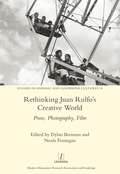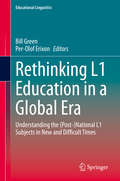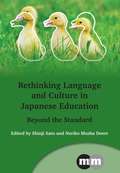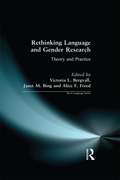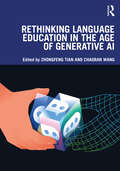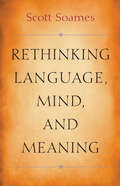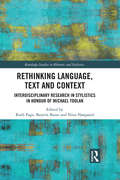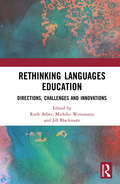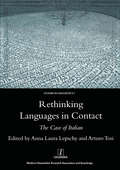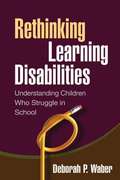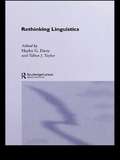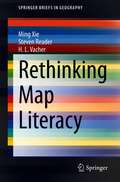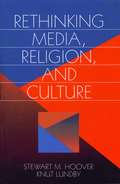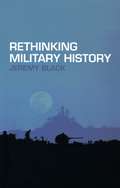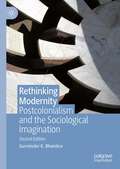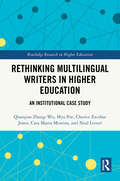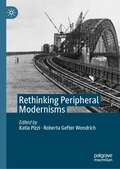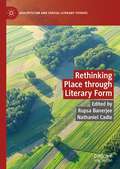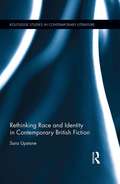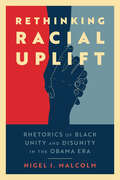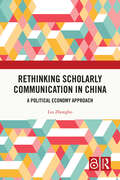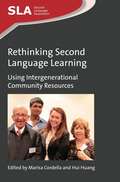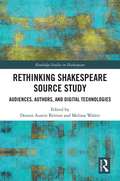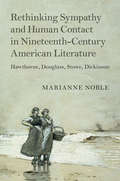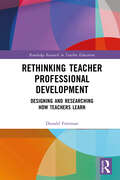- Table View
- List View
Rethinking Juan Rulfo's Creative World: Prose, Photography, Film (Legenda)
by Nuala Finnegan Dylan BrennanThough primarily known for his haunting, enigmatic novel Pedro Páramo and the unrelenting depictions of the failures of post-revolutionary Mexico in his short story collection, El Llano en llamas, Juan Rulfo also worked as scriptwriter on various collaborative film projects and his powerful interventions in the area of documentary photography ensure that he continues to inspire interest worldwide. Bringing together some of the most significant names in Rulfian scholarship, this anthology engages with the complexity and diversity of Rulfo’s cultural production. The essays in the collection bring the Rulfian texts into dialogues with other cultural traditions and techniques including the Japanese Noh or "mask" plays and modernist experimentation in the Irish language. They also deploy diverse theoretical frameworks that range from Roland Barthes’ work on studium and punctum in photography to Henri Lefebvre’s ideas on space and spatiality and the postmodern insights of Jean Baudrillard on the nature of the simulacrum and the hyperreal. In this way, innovative approaches are brought to bear on the Rulfian texts as a way of illuminating the rich tensions and anxieties they evoke about Mexico, about history, about art and about the human condition.
Rethinking L1 Education in a Global Era: Understanding the (Post-)National L1 Subjects in New and Difficult Times (Educational Linguistics #48)
by Bill Green Per-Olof ErixonThis book brings together a range of scholars from 10 different countries to address the contemporary state of play in national standard language education – i.e. the L1 subjects. It seeks to understand the field from within a comparative-historical and transnational frame. Four thematic threads are woven through the volume: educationalisation; globalisation; pluriculturalism; and technologization. The chapters range over various aspects of L1 as a school subject: literature, language and literacy; reading and writing; media and digital technology; the dialogue between curriculum inquiry and Didaktik studies; the continuing relevance of Bildung; the significance of history and nation; and new challenges of culture and environment in the face of climate change. The book concludes with a reflection on the prospects for L1 education today and tomorrow, in a now thoroughly globalised context and, accordingly, deeply implicated in a necessary new project of nation re-building.
Rethinking Language and Culture in Japanese Education
by Shinji Sato Neriko Musha DoerrHow does language or culture come to be standardized to the degree that it is considered 'homogeneous'? How does teaching language relate to such standardization processes? How can teaching be mindful of the standardization processes that potentially involve power relations? Focusing on the case of Japanese, which is often viewed as homogenous in terms of language and culture, this volume explores these questions in a wide range of contexts: the notions of translation and modernity, the ideologies of the standardization of regional dialects in Japan, current practices in college Japanese-as-a- Foreign-Language classrooms in the United States, discourses in journals of Japanese language education, and classroom practices in nursery and primary schools in Japan. This volume's investigation of standardization processes of Japanese language and culture addresses the intersections of theoretical and practical concerns of researchers and educators that are often overlooked.
Rethinking Language and Gender Research: Theory and Practice (Real Language Series)
by Victoria BergvallRethinking Language and Gender Research is the first book focusing on language and gender to explicitly challenge the dichotomy of female and male use of language. It represents a turning point in language and gender studies, addressing the political and social consequences of popular beliefs about women's language and men's language and proposing new ways of looking at language and gender. The essays take a fresh approach to the study of subjects such as language and sex and the use of language to produce and maintain power and prestige. Topics explored in this text include sex and the brain; the language of a rape hearing; teenage language; radio talk show exchanges; discourse strategies of African American women; political implications for language and gender studies; the relationship between sex and gender and the construction of identity through language.A useful introductory chapter sets the articles in context, explaining the relationships that exist between them, and full cross-referencing between articles and an extensive index allow for easy access to information. The interdisciplinary approach of the text, the wide-range of methodologies presented, and the comprehensive review of the current literature will make this book invaluable reading for all upper-level undergraduate students, postgraduate students and researchers in the fields of linguistics, sociolinguistics, gender and cultural studies.
Rethinking Language Education in the Age of Generative AI
by Zhongfeng Tian Chaoran WangRethinking Language Education in the Age of Generative AI bridges the gap between theory, research, and practice in AI and language education. Through conceptual pieces, empirical studies, and practical applications, this book provides critical insights and implications for reimagining language education in the age of generative AI.The contributors explore a wide range of issues, reflections, and innovations in AI and language education across diverse contexts, including English as a Second Language (ESL), English as a Foreign Language (EFL), foreign language learning, postsecondary pathways programs for international students, and language teacher education programs. Topics examined include critical AI literacy, GenAI-informed second language teaching and assessment, teacher and student perceptions, tool development for language learning, as well as ethical considerations, policies, and guidelines. The book incorporates interdisciplinary perspectives, such as L2/foreign language studies, education, and applied linguistics, as well as global insights from countries like the United States, Canada, South Korea, Thailand, Indonesia, and the Philippines.This book is essential for students and researchers seeking to leverage AI to enhance language teaching and learning in innovative, critical, ethical, and responsible ways.
Rethinking Language, Mind, and Meaning
by Scott SoamesIn this book, Scott Soames argues that the revolution in the study of language and mind that has taken place since the late nineteenth century must be rethought. The central insight in the reigning tradition is that propositions are representational. To know the meaning of a sentence or the content of a belief requires knowing which things it represents as being which ways, and therefore knowing what the world must be like if it is to conform to how the sentence or belief represents it. These are truth conditions of the sentence or belief. But meanings and representational contents are not truth conditions, and there is more to propositions than representational content. In addition to imposing conditions the world must satisfy if it is to be true, a proposition may also impose conditions on minds that entertain it. The study of mind and language cannot advance further without a conception of propositions that allows them to have contents of both of these sorts. Soames provides it.He does so by arguing that propositions are repeatable, purely representational cognitive acts or operations that represent the world as being a certain way, while requiring minds that perform them to satisfy certain cognitive conditions. Because they have these two types of content--one facing the world and one facing the mind--pairs of propositions can be representationally identical but cognitively distinct. Using this breakthrough, Soames offers new solutions to several of the most perplexing problems in the philosophy of language and mind.
Rethinking Language, Text and Context: Interdisciplinary Research in Stylistics in Honour of Michael Toolan (Routledge Studies in Rhetoric and Stylistics)
by Ruth Page Beatrix Busse Nina NørgaardThis collection of original research highlights the legacy of Michael Toolan’s pioneering contributions to the field of stylistics and in so doing provides a critical overview of the ways in which language, text, and context are analyzed in the field and its related disciplines. Featuring work from an international range of contributors, the book illustrates how the field of stylistics has evolved in the 25 years since the publication of Toolan’s seminal Language, Text and Context, which laid the foundation for the analysis of the language and style in literary texts. The volume demonstrates how technological innovations and the development of new interdisciplinary methodologies, including those from corpus, cognitive, and multimodal stylistics, point to the greater degree of interplay between language, text, and context exemplified in current research and how this dynamic relationship can be understood by featuring examples from a variety of texts and media. Underscoring the significance of Michael Toolan’s extensive work in the field in the evolution of literary linguistic research, this volume is key reading for students and researchers in stylistics, discourse studies, corpus linguistics, and interdisciplinary literary studies.
Rethinking Languages Education: Directions, Challenges and Innovations
by Ruth Arber Michiko Weinmann Jill BlackmoreRethinking Languages Education assembles innovative research from experts in the fields of sociocultural theory, applied linguistics and education. The contributors interrogate innovative and recent thinking and broach controversies about the theoretical and practical considerations that underpin the implementation of effective Languages pedagogy in twenty-first-century classrooms. Crucially, Rethinking Languages Education explores established understandings about language, culture and education to provide a more comprehensive and flexible understanding of Languages education that responds to local classrooms impacted by global and transnational change, and the politics of language, culture and identity. Rethinking Languages Education focuses on questions about ways that we can develop farsighted and successful Languages education for diverse students in globalised contexts. The response to these questions is multi-layered, and takes into account the complex interactions between policy, curriculum and practice, as well as their contention and implementation. In doing so, this book addresses and integrates innovative perspectives of contemporary theory and pedagogy for Languages, TESOL and EAL/D education. It includes diverse discussions around practice, and addresses issues of the dominance of prestige Languages programs for ‘minority’ and ‘heritage’ languages, as well as discussing controversies about the current provision of English and Languages programs around the world.
Rethinking Languages in Contact: The Case of Italian
by Anna-Laura Lepschy"Taking as its theme the interaction between Italian and other languages, and marking the 50th anniversary of the publication of Weinreich's seminal Languages in Contact, this volume provides an up-to-date survey of the role of linguistic and cultural interaction in the process of language change. The range of contributions covers: theoretical issues; different forms of language contact in Medieval and Renaissance Italy; dialect transition and diversity in the North and South of Italy; lexical and morphological borrowings; register and syntactic loans in the Romance area; old and new contact varieties of Italian in the Mediterranean, including Malta and North Africa; and, finally, Italian under pressure from English in EU institutions. The volume is published in memory of Joseph Cremona (1922-2003), and includes a bibliography of his work. Anna Laura Lepschy is Visiting Professor at the Universities of Reading and Toronto, and Emeritus Professor at University College London. Arturo Tosi is Professor of Italian at Royal Holloway, University of London. With the contributions: Peter Matthews - On Re-reading Weinreich's Languages in Contact; Nigel Vincent; Languages in Contact in Medieval Italy; Brian Richardson - Latin and Italian in Contact in Some Renaissance Grammars; Cecilia Robustelli - Latin and Vernacular in Contact in the Sixteenth Century: The Latin Model of Giambullari's Grammar; and, Mair Parry - Markedness, Salience and Language Change: Exploring an Italo-Romance Transition Area. It also includes: John Green - The North-South Axis of Romance: Contact Reinforcing Typology? Martin Maiden - Accommodating Synonymy: How Some Italo-Romance Verbs React to Lexical and Morphological Borrowing; Chris Pountain - Syntactical Borrowing as a Function of Register; Adam Ledgeway - The Dual Complementizer System in Southern Italy: Spirito Greco, Materia Romanza? Rosanna Sornicola - Dialectology and History: The Problem of the Adriatic-Tyrrhenian Dialect Corridor; Alberto Varvaro - The Maghreb Papers in Italian Discovered by Joe Cremona; Joseph Brincat - Languages and Varieties in Use in Malta Today: Maltese, English, Italian, Maltese English and Maltaliano; and, Arturo Tosi - Languages in Contact with and without Speaker Interaction."
Rethinking Learning Disabilities: Understanding Children Who Struggle in School
by Deborah WaberExperts have yet to reach consensus about what a learning disability is, how to determine if a child has one, and what to do about it. Leading researcher and clinician Deborah Waber offers an alternative to the prevailing view of learning disability as a problem contained within the child. Instead, she shows how learning difficulties are best understood as a function of the developmental interaction between the child and the world. Integrating findings from education, developmental psychology, and cognitive neuroscience, she offers a novel approach with direct practical implications. Detailed real-world case studies illustrate how this approach can promote positive outcomes for children who struggle in school.
Rethinking Linguistics (Routledge Advances in Communication and Linguistic Theory #No.3)
by Hayley G. Davis Talbot J. TaylorThis book deals with the need to rethink the aims and methods of contemporary linguistics. Orthodox linguists' discussions of linguistic form fail to exemplify how language users become language makers. Integrationist theory is used here as a solution to this basic problem within general linguistics. The book is aimed at an interdisciplinary readership, comprising those engaged in study, teaching and research in the humanities and social sciences, including linguistics, philosophy, sociology and psychology.
Rethinking Map Literacy (SpringerBriefs in Geography)
by H. L. Vacher Ming Xie Steven ReaderThis book provides two conceptual frameworks for further investigation of map literacy and fills in a gap in map literacy studies, addressing the distinction between reference maps and thematic maps and the varying uses of quantitative map literacy (QML) within and between the two. The text offers two conceptual frameworks and uses specific map examples to explore this variability in map reading skills and knowledge, with the goal of informing educational pedagogy and practices within geography and related disciplines. The book will appeal to cartographers and geographers as a new perspective on a tool of communication they have long employed in their disciplines, and will also appeal to those involved in the educational pedagogy of information and data literacy as a way to conceptualize the development of curricula and teaching materials in the increasingly important arena of the interplay between quantitative data and map-based graphics. The first framework discussed is based on a three-set Venn model, and addresses the content and relationships of three “literacies” – map literacy, quantitative literacy and background information. As part of this framework, the field of QML is introduced, conceptualized, and defined as the knowledge (concepts, skills and facts) required to accurately read, use, interpret and understand the quantitative information embedded in geographic backgrounds. The second framework is of a compositional triangle based on (1) the ratio of reference to thematic map purpose and (2) the level of generalization and/or distortion within maps. In combination, these two parameters allow for any type of map to be located within the triangle as a prelude to considering the type and level of quantitative literacy that comes into play during map reading. Based on the two frameworks mentioned above, the pedagogical tool of “word problems” is applied to “map literacy” in an innovative way to explore the variability of map reading skills and knowledge based on specific map examples.
Rethinking Media, Religion, and Culture
by Professor Stewart Hoover Professor Knut LundbyThe growing connections between media, culture and religion are increasingly evident in contemporary society, but until now have rarely been theoretically linked. The contributors to this volume effectively combine these areas into a coherent whole. The issues they examine include: the decline of religious institutions during the late twentieth century; the increasing autonomy and individualized practice of religion; and the surge of media and media-based icons that are often imbued with religious qualities, and the ensuing effect on cultural practices.
Rethinking Military History
by Jeremy BlackRethinking Military History is a bold new 'thought book' that reconsiders military history at the beginning of the twenty-first century. The chapters provide a valuable and concise survey of the main themes in the study of military history from 1500 to the present day as Jeremy Black reveals the main trends in the practice and approach to mili
Rethinking Modernity: Postcolonialism and the Sociological Imagination
by Gurminder K. BhambraThe second edition of this influential book addresses how the experiences and claims of non-European ‘others’ have been rendered invisible to the standard narratives and analytical frameworks of sociological understandings of modernity. In challenging the dominant, Euro-centred accounts of the emergence and development of modernity, Bhambra puts forward an argument for ‘connected histories’ in the reconstruction of historical sociology at a global level. This updated version of the original, published in 2007, adds a new preface which explores key themes that Bhambra has further developed over the intervening years: specifically, how the rethinking of modernity enables us to reconstruct sociology and a call for a 'reparatory sociology' committed to the repair of the social sciences and the securing of global justice.
Rethinking Multilingual Writers in Higher Education: An Institutional Case Study (Routledge Research in Higher Education)
by Neal Lerner Qianqian Zhang-Wu Mya Poe Cherice Escobar Jones Cara Marta MessinaRethinking Multilingual Writers in Higher Education: An Institutional Case Study explores the complexities of multilingual students as language users and learners, emphasizing the distinctive assets that they bring to their education and the ways in which institutions of higher education can better meet their needs.Teachers, university administrators, advisors, and other support staff will gain an understanding of the resources, challenges, and successes of this growing student population and become better equipped to provide them with the best possible educational opportunities. Through mixed-methods case studies focusing on the Northeastern University Writing Program and Writing Center, the authors unpack the complexity of multilingual students’ identities and languaging to challenge deficit and homogenizing narratives that overlook their linguistic assets and diverse educational experiences. Working within and against university categories for collecting information about students and assessing their writing, authors point out the limits of terms such as “international” and the problems with dichotomous L1/L2 and native/nonnative speaker labels. Finally, the book offers lessons learned about the importance of conducting program self-study to inform research and pedagogy for higher education institutions around the world.This book will appeal to writing studies and linguistics scholars with interests in multilingualism, assessment, and mobility, as well as institutional stakeholders and researchers of higher education and multicultural education.
Rethinking Peripheral Modernisms
by Katia Pizzi Roberta Gefter WondrichThis collection of essays reappraises the contributions made by modernist movements from regions generally regarded as peripheral or semi-peripheral to a global aesthetic of Modernism. It particularly focuses on European semi-peripheries, combining theoretical chapters and individual case studies to examine the cultural and aesthetic complexities of so-called peripheral modernisms. Contributing to research on the ‘transnational turn’ in New Modernist Studies, the volume takes recent scholarship on postcolonial modernisms one step further by exploring a broader geopolitical expanse than the (formerly) colonised regions under global capitalism. It highlights the local and translocal specificities of modernist movements from regions such as Eastern and Central Europe and the Mediterranean to offer new insights into the concept of global modernism.
Rethinking Place through Literary Form (Geocriticism and Spatial Literary Studies)
by Rupsa Banerjee Nathaniel CadleRethinking Place Through Literary Form regards the relationship between place and linguistic form as challenging real and perceived configurations of place and renegotiating geopolitically determined categories of the ‘centre’ and ‘periphery’. The volume argues that the rise of scattered communities, displaced physically and psychologically by urban and alienated geographies, necessitates linguistic negotiations of one’s locatedness in place as the chief means of uncovering and re-building identity. By looking at narrative re-imaginings of forgotten and interrupted intimacies between habitation and place from diverse parts of the world, the twelve chapters address the growing need to expand and alter approaches to literary representations of modernity and modes of self-location.
Rethinking Race and Identity in Contemporary British Fiction (Routledge Studies in Contemporary Literature)
by Sara UpstoneThis book takes a post-racial approach to the representation of race in contemporary British fiction, re-imagining studies of race and British literature away from concerns with specific racial groups towards a more sophisticated analysis of the contribution of a broad, post-racial British writing. Examining the work of writers from a wide range of diverse racial backgrounds, the book illustrates how contemporary British fiction, rather than merely reflecting social norms, is making a radical contribution towards the possible future of a positively multi-ethnic and post-racial Britain. This is developed by a strategic use of the realist form, which becomes a utopian device as it provides readers with a reality beyond current circumstances, yet one which is rooted within an identifiable world. Speaking to the specific contexts of British cultural politics, and directly connecting with contemporary debates surrounding race and identity in Britain, the author engages with a wide range of both mainstream and neglected authors, including Ian McEwan, Zadie Smith, Julian Barnes, John Lanchester, Alan Hollinghurst, Martin Amis, Jon McGregor, Andrea Levy, Bernardine Evaristo, Hanif Kureishi, Kazuo Ishiguro, Hari Kunzru, Nadeem Aslam, Meera Syal, Jackie Kay, Maggie Gee, and Neil Gaiman. This cutting-edge volume explores how contemporary fiction is at the centre of re-thinking how we engage with the question of race in twenty-first-century Britain.
Rethinking Racial Uplift: Rhetorics of Black Unity and Disunity in the Obama Era
by Nigel I. Malcolm2023 CHOICE Outstanding Academic TitleIn 1903, W. E. B. Du Bois wrote about the Talented Tenth in an influential essay of the same name. The concept exalted college-educated Blacks who Du Bois believed could provide the race with the guidance it needed to surmount slavery, segregation, and oppression in America. Although Du Bois eventually reassessed this idea, the rhetoric of the Talented Tenth resonated, still holding sway over a hundred years later. In Rethinking Racial Uplift: Rhetorics of Black Unity and Disunity in the Obama Era, author Nigel I. Malcolm asserts that in the post–civil rights era, racial uplift has been redefined not as Black public intellectuals lifting the masses but as individuals securing advantage for themselves and their children. Malcolm examines six best-selling books published during Obama’s presidency—including Randall Kennedy’s Sellout, Bill Cosby’s and Alvin Poussaint’s Come On, People, and Ta-Nehisi Coates’s Between the World and Me—and critically analyzes their rhetorics on Black unity, disunity, and the so-called “postracial” era. Based on these writings and the work of political and social scientists, Malcolm shows that a large, often-ignored, percentage of Blacks no longer see their fate as connected with that of other African Americans. While many Black intellectuals and activists seek to provide a justification for Black solidarity, not all agree. In Rethinking Racial Uplift, Malcolm takes contemporary Black public intellectual discourse seriously and shows that disunity among Blacks, a previously ignored topic, is worth exploring.
Rethinking Scholarly Communication in China: A Political Economy Approach
by Liu ZhongboThis book examines science and technology policies in China over time and explores the development of scholarly communication through the lens of the political economy of communication.Despite political censorship and restrictions on the production of academic knowledge in China, the number of scholarly publications has skyrocketed over the past 20 years. By explaining these seemingly contradictory phenomena, this study provides insight into the complex landscape of scholarly communication in China, shaped by the government in collaboration with commercial publishers. The book examines the dynamic relationship between the state and the market, including their key players, which determines the production and dissemination of academic knowledge. From a political economy perspective, it investigates how the academic governance complex, a system that intertwines communication, politics, and economics, has been established in China. It then discusses the impact of this system on the production of academic knowledge in the country.The title will serve as a key reference for academics, researchers, and students interested in the intersection of communication studies, librarianship, and political science, particularly those focusing on China's academic knowledge production and scholarly communication.
Rethinking Second Language Learning: Using Intergenerational Community Resources
by Hui Huang Marisa CordellaThis book evaluates a project where formal classroom learning of a second language was supplemented with informal, natural interactions with older native speakers of the target language, delivering a number of pedagogical and societal benefits. The authors introduce a model of intergenerational, intercultural encounters which aims to promote the use of community language resources; enrich the experiences of young learners; foster greater understanding between generations; break down cultural stereotypes; encourage appreciation of different cultures and enhance the quality of life and community engagement of older people with a bi/multilingual background. It draws on theories of language acquisition, discourse analysis and psychosocial perspectives to propose a model of language learning for students that can be used for any language or locality. It is therefore an essential resource for graduate students, researchers and language teachers as well as for education, aged and youth care policy makers, practitioners and community services workers who are interested in innovative language pedagogy.
Rethinking Shakespeare Source Study: Audiences, Authors, and Digital Technologies (Routledge Studies in Shakespeare)
by Dennis Austin Britton Melissa WalterThis book asks new questions about how and why Shakespeare engages with source material, and about what should be counted as sources in Shakespeare studies. The essays demonstrate that source study remains an indispensable mode of inquiry for understanding Shakespeare, his authorship and audiences, and early modern gender, racial, and class relations, as well as for considering how new technologies have and will continue to redefine our understanding of the materials Shakespeare used to compose his plays. Although source study has been used in the past to construct a conservative view of Shakespeare and his genius, the volume argues that a rethought Shakespearean source study provides opportunities to examine models and practices of cultural exchange and memory, and to value specific cultures and difference. Informed by contemporary approaches to literature and culture, the essays revise conceptions of sources and intertextuality to include terms like "haunting," "sustainability," "microscopic sources," "contamination," "fragmentary circulation" and "cultural conservation." They maintain an awareness of the heterogeneity of cultures along lines of class, religious affiliation, and race, seeking to enhance the opportunity to register diverse ideas and frameworks imported from foreign material and distant sources. The volume not only examines print culture, but also material culture, theatrical paradigms, generic assumptions, and oral narratives. It considers how digital technologies alter how we find sources and see connections among texts. This book asserts that how critics assess and acknowledge Shakespeare’s sources remains interpretively and politically significant; source study and its legacy continues to shape the image of Shakespeare and his authorship. The collection will be valuable to those interested in the relationships between Shakespeare’s work and other texts, those seeking to understand how the legacy of source study has shaped Shakespeare as a cultural phenomenon, and those studying source study, early modern authorship, implications of digital tools in early modern studies, and early modern literary culture.
Rethinking Sympathy and Human Contact in Nineteenth-Century American Literature: Hawthorne, Douglass, Stowe, Dickinson (Cambridge Studies in American Literature and Culture #182)
by Marianne NobleIn accessible and impassioned discussions of literature and philosophy, this book reveals a surprising approach to the intractable problem of human contact. Nathaniel Hawthorne, Frederick Douglass, Harriet Beecher Stowe, and Emily Dickinson rethought the nature of human contact, turning away from transcendentalist approaches and towards sympathetic ones. Their second and third works portray social masks as insufficient, not deceptive, and thus human contact requires not violent striking through the mask but benevolent skepticism towards persons. They imagine that people feel real in a real world with real others when they care for others for the other's sake and when they make caring relationships the cornerstone of their own being. Grounded in philosophies of sympathy - including Adam Smith and J. G. Herder - and relational psychology - Winnicott and Benjamin - Rethinking Sympathy and Human Contact in Nineteenth-Century American Literature shows that antebellum literature rejects individualist definitions of the human and locates the antidote to human disconnection in sympathy.
Rethinking Teacher Professional Development: Designing and Researching How Teachers Learn (Routledge Research in Teacher Education)
by Donald FreemanThis book presents a new set of ideas to challenge established thinking and to guide researching and designing teacher professional development. Grounded in the work of the Learning4Teaching Project which documented public-sector teachers’ experiences and learning from professional development in three countries, the volume presents a sociomaterial perspective on teacher sensemaking. This teacher-centered perspective disputes the "conventional calculus" in which teachers learn content that they apply in their classrooms. Part I outlines conventional issues in how teacher learning and professional development have been conceptualized and studied; Part II introduces a new group of concepts that rethink these assumptions; and Part III offers important insights to inform professional development across disciplines, cultures, and contexts. Written by a leading international teacher educator in an accessible style that incorporates visual representations and project data, the book will appeal to practitioners, scholars, and researchers who design and research how teachers learn in professional development.
